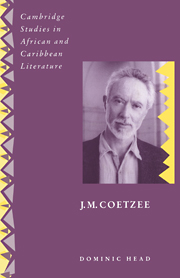Book contents
- Frontmatter
- Contents
- Preface
- List of abbreviations
- Chronology
- 1 The writer's place: Coetzee and postcolonial literature
- 2 Writing violence: Dusklands
- 3 The wrong kind of love: In the Heart of the Country
- 4 An ethical awakening: Waiting for the Barbarians
- 5 Gardening as resistance: Life and Times of Michael K
- 6 The maze of doubting: Foe
- 7 A true confession: Age of Iron
- 8 Producing the demon: The Master of Petersburg
- Notes
- Select bibliography
- Index
3 - The wrong kind of love: In the Heart of the Country
Published online by Cambridge University Press: 01 March 2010
- Frontmatter
- Contents
- Preface
- List of abbreviations
- Chronology
- 1 The writer's place: Coetzee and postcolonial literature
- 2 Writing violence: Dusklands
- 3 The wrong kind of love: In the Heart of the Country
- 4 An ethical awakening: Waiting for the Barbarians
- 5 Gardening as resistance: Life and Times of Michael K
- 6 The maze of doubting: Foe
- 7 A true confession: Age of Iron
- 8 Producing the demon: The Master of Petersburg
- Notes
- Select bibliography
- Index
Summary
Through its explicit exploration of authorial complicity, Dusklands establishes a ground rule which can subsequently be taken as a given. In his first novel, Coetzee identifies his historical links in the literature of the post-colonizer, making the re-presentation of a directly personal guilt superfluous. In In the Heart of the Country (1977), the question of complicity, and an associated metafictional preoccupation, is taken in a new direction.
In some ways, In the Heart of the Country is Coetzee's most difficult and forbidding novel. It is a disruptive and disturbing book which offers an implicit admission of the semi-impotence of the white intellectual/writer in South Africa, and an oblique reflection on South African literary culture, and Afrikaner mythology This has a particular resonance for South Africa after the Soweto riots (1976–7), which galvanized Black Consciousness, and produced a disregard for white assistance, at this time, in the anti-apartheid struggle. A full understanding of all the Coetzee novels, of course, depends upon a knowledge of the South African context, but, where the allegorical dimension of, say, Waiting for the Barbarians invites broader reflections on power and morality, this novel is explicitly inward-looking. In the South African edition, in fact, the dialogue was presented in Afrikaans, with the rest of the narrative written in English. If other editions – written entirely in English – represent a concession to the international English-speaking audience, the original conception suggests that the Afrikaner was Coetzee's principal target reader.
- Type
- Chapter
- Information
- J. M. Coetzee , pp. 49 - 71Publisher: Cambridge University PressPrint publication year: 1998



